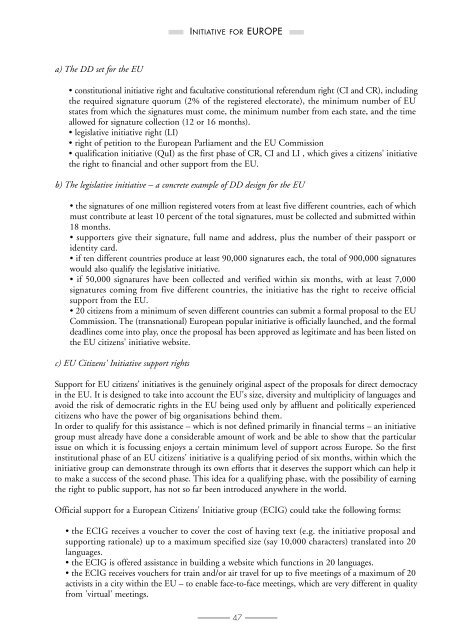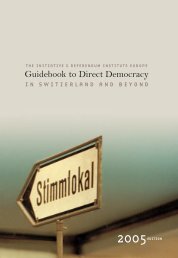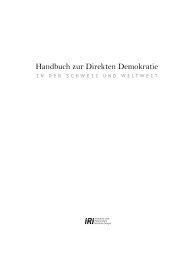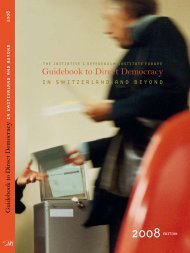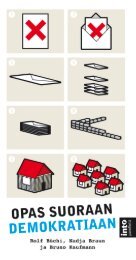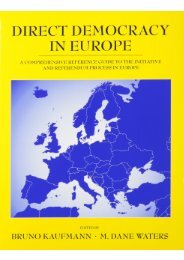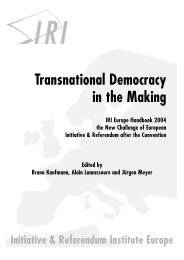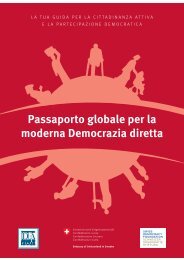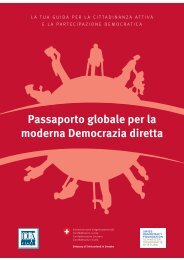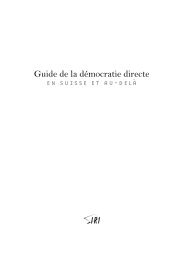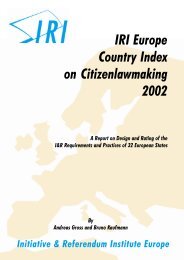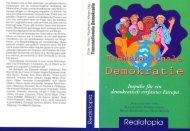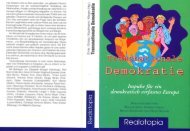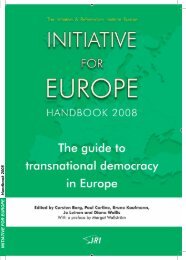Initiative for Europe Handbook 2008
The guide to transnational democracy in Europe
The guide to transnational democracy in Europe
You also want an ePaper? Increase the reach of your titles
YUMPU automatically turns print PDFs into web optimized ePapers that Google loves.
INITIATIVE FOR EUROPE<br />
a) The DD set <strong>for</strong> the EU<br />
• constitutional initiative right and facultative constitutional referendum right (CI and CR), including<br />
the required signature quorum (2% of the registered electorate), the minimum number of EU<br />
states from which the signatures must come, the minimum number from each state, and the time<br />
allowed <strong>for</strong> signature collection (12 or 16 months).<br />
• legislative initiative right (LI)<br />
• right of petition to the <strong>Europe</strong>an Parliament and the EU Commission<br />
• qualification initiative (QuI) as the first phase of CR, CI and LI , which gives a citizens' initiative<br />
the right to financial and other support from the EU.<br />
b) The legislative initiative – a concrete example of DD design <strong>for</strong> the EU<br />
• the signatures of one million registered voters from at least five different countries, each of which<br />
must contribute at least 10 percent of the total signatures, must be collected and submitted within<br />
18 months.<br />
• supporters give their signature, full name and address, plus the number of their passport or<br />
identity card.<br />
• if ten different countries produce at least 90,000 signatures each, the total of 900,000 signatures<br />
would also qualify the legislative initiative.<br />
• if 50,000 signatures have been collected and verified within six months, with at least 7,000<br />
signatures coming from five different countries, the initiative has the right to receive official<br />
support from the EU.<br />
• 20 citizens from a minimum of seven different countries can submit a <strong>for</strong>mal proposal to the EU<br />
Commission. The (transnational) <strong>Europe</strong>an popular initiative is officially launched, and the <strong>for</strong>mal<br />
deadlines come into play, once the proposal has been approved as legitimate and has been listed on<br />
the EU citizens' initiative website.<br />
c) EU Citizens' <strong>Initiative</strong> support rights<br />
Support <strong>for</strong> EU citizens' initiatives is the genuinely original aspect of the proposals <strong>for</strong> direct democracy<br />
in the EU. It is designed to take into account the EU's size, diversity and multiplicity of languages and<br />
avoid the risk of democratic rights in the EU being used only by affluent and politically experienced<br />
citizens who have the power of big organisations behind them.<br />
In order to qualify <strong>for</strong> this assistance – which is not defined primarily in financial terms – an initiative<br />
group must already have done a considerable amount of work and be able to show that the particular<br />
issue on which it is focussing enjoys a certain minimum level of support across <strong>Europe</strong>. So the first<br />
institutional phase of an EU citizens' initiative is a qualifying period of six months, within which the<br />
initiative group can demonstrate through its own ef<strong>for</strong>ts that it deserves the support which can help it<br />
to make a success of the second phase. This idea <strong>for</strong> a qualifying phase, with the possibility of earning<br />
the right to public support, has not so far been introduced anywhere in the world.<br />
Official support <strong>for</strong> a <strong>Europe</strong>an Citizens' <strong>Initiative</strong> group (ECIG) could take the following <strong>for</strong>ms:<br />
• the ECIG receives a voucher to cover the cost of having text (e.g. the initiative proposal and<br />
supporting rationale) up to a maximum specified size (say 10,000 characters) translated into 20<br />
languages.<br />
• the ECIG is offered assistance in building a website which functions in 20 languages.<br />
• the ECIG receives vouchers <strong>for</strong> train and/or air travel <strong>for</strong> up to five meetings of a maximum of 20<br />
activists in a city within the EU – to enable face-to-face meetings, which are very different in quality<br />
from 'virtual' meetings.<br />
47


